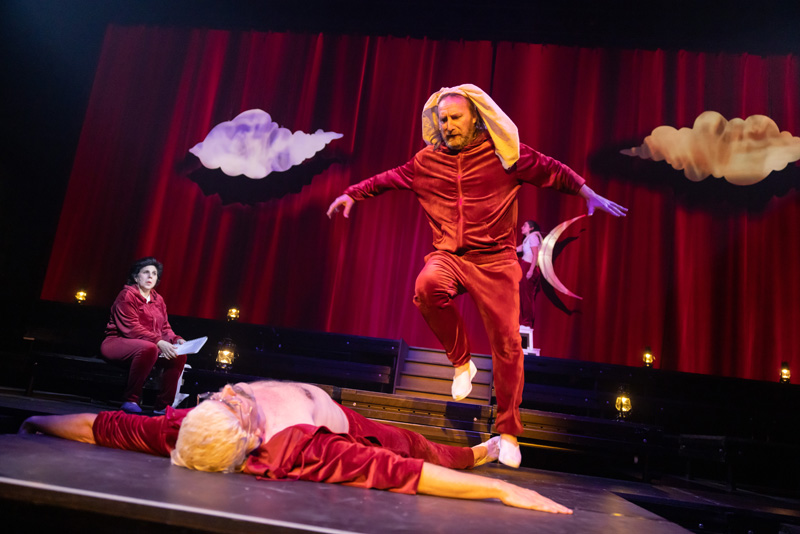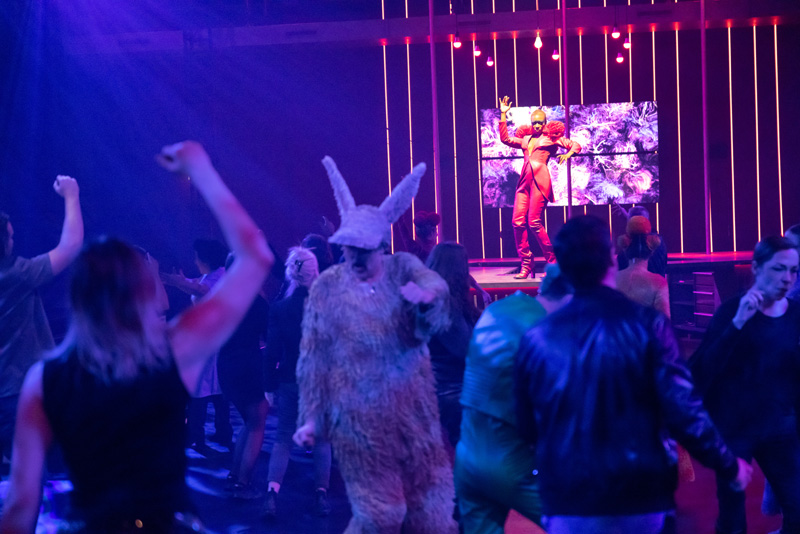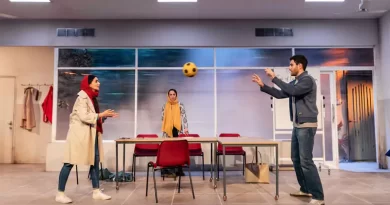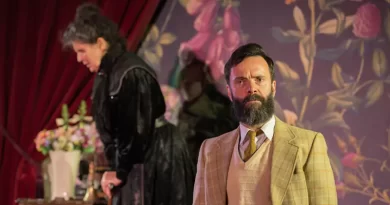“Songes d’une Nuit…” at Luxembourg City’s Grand Théâtre
Dana Rufolo in Luxembourg
31 January 2023
Songes d’une nuit…, an interpretation of A Midsummer Night’s Dream, developed as a production of Les théâtres de la Ville de Luxembourg and directed by Myriam Muller for a January 2023 run at the Studio Theatre of Luxembourg city’s Grand Théâtre, reveals the hallmark of Luxembourg’s multilingual population in that emphasis is put on visual elements rather than on language.

Puck sprays essence of magic.
Photo credit: Bohumil Kostohryz.
This is comprehensible in a country where nearly half of the population –from 175 different countries – doesn’t have Luxembourgish nationality, and the plethora of languages they speak are distributed among a relatively small total population of 645,000; autochthonic Luxembourgers themselves are invariably trilingual (including Lëtzebergish or Luxembourgish).
Communication is a challenge with such a demography, and national theatre is as much affected as are the businesses, banks, and European institutions that are located in Luxembourg. Directors must choose the language they will be using and they then rely on visual elements to make their intentions as clear as possible to audience members who may not be totally at ease in that language.
Muller chose to produce Shakespeare’s play in French – Songes d’une nuit… (One Night’s Dreams is the literal translation from French), working with the modern 2008 translation by Pascal Collin which, he claims, “updates the link between actor and audience”. But his French doesn’t capture the poetry of Shakespeare’s language very well.
When you take away Shakespeare’s poetry and its theatrical capacity to paint one scene after another in our imagination, then what remains is a charming story of a night in a magical wood where ardent lovers dream themselves into false love affairs, fairies and elves slip through the dark making mischief and amateur actors spin a laborious storyline that tells rather than suggests, displays rather than evokes. Myriam Muller realizes this and so she has shaken up Shakespeare with an intensely technologically-enriched mise en scène.

The Rude Mechanicals perform their play.
Photo credit: Bohumil Kostohryz.
There is virtually no visual element that Muller has not used. Amplified songs and music (sound engineer Emre Sevindik) liven up the action. Agitated images of ants, leaves, pine needles, branches in fog and mysterious curving colours swirl over the Studio’s walls and over spectators’ bodies. The lights by Renaud Ceulemans rapidly change colours; one particularly pleasing bit of lighting work has a series of green spots above the grid that look like wine gums. The costumes (by Sophie Van den Keybus) are vivid and colourful. There are strobe lights and lanterns and stage smoke. The fairies led by Céline Camara as Titania are sexy pole dancers. The two men Lysandre (Konstantin Rommelfangen) and Démétrius (Pitt Simon) fight hand to hand stripped to their waists; the two women Hermia (Rosalie Maes) and Helena (Manon Raffaelli) similarly fight, stripped of their leather and sequined jackets.
During an intermission period, the cast urges audience members to dance – and they do. The dancing takes place in the elongated roughly rectangular acting space around which the audience is seated in a geometrical design of low-lying benchlike seats that keep us extremely close to the action. There is a touch of promenade theatre when audience members are asked to move to a different part of the Studio space so as to be in the correct position to watch the Rude Mechanicals performing their play.
The programme states that Songes d’une nuit… celebrates Luxembourg being post Covid-19 and wants to return us to the intimacy of a shared breathing space. Not a person was wearing a mask the night I attended the show.

Dancing in the intermission.
Photo credit: Bohumil Kostohryz.
Actors move rapidly up and down the length of the Studio Theater using an upper catwalk space for delivering lines; the director of the Rude Mechanicals’ play Pyrame et Thisbé (Pyramus and Thisbe), Madame Quince (Catherine Mestoussis), blares out instructions so furiously that what she says is inaudible (but then this production isn’t about words, so what does it matter if some lines are lost?). She is normally a bathroom attendant who is seldom without a cleaning rag, and the three sinks and several stall doors of the bathroom she cleans are visible, elevated at one end of the stage setup.
At the start of the production and a few times after, we see camera close-ups on screens at opposite ends of the Studio space of her cleaning walls and mirrors. A fellow would-be thespian tightens up bolts and vacuums the floor that was designated as stage space shortly before the play gets underway. This backstory reveals their disconnection from the arts, explaining if you will why their play is amateurish.
But the night isn’t interpreted as needing explanations. The characters are under a spell, and when they awaken from it, they are confused. What exactly had they experienced? They don’t ever really know. It doesn’t matter. The Duke is marrying. Pyrame et Thisbé, complete with cardboard clouds and a walking wall that looks like a mattress, are presenting their play. Everyone is in her or his proper amorous group. Life goes on.
The audience was extremely enthusiastic.









